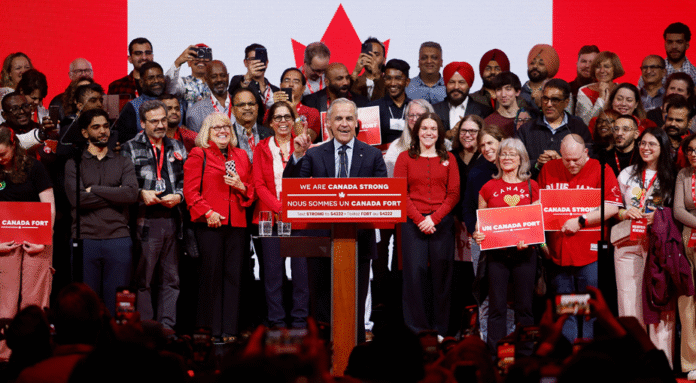By Darshini Dayanidhi
On April 28, 2025, the Liberal Party of Canada, led by Mark Carney, emerged victorious in the federal election, marking their fourth consecutive term in government and third consecutive minority government. This election was notable as the Liberals won the popular vote for the first time since 2015, securing 43.7%—their highest share since 1980.
The Liberals captured 168 seats in the 343-seat House of Commons, just four seats shy of the 172 needed for a majority. This outcome positions them to continue governing as a minority, likely seeking support from other parties to pass legislation.
The election saw increased voter engagement, with a high turnout influenced by nationalistic sentiments and concerns over U.S.-Canada relations. Approximately 7.3 million Canadians voted early, reflecting heightened political interest.
Mark Carney’s campaign focused on economic stability, environmental commitments, and asserting Canadian sovereignty, resonating with a broad spectrum of voters. His leadership is expected to steer Canada towards diversified international partnerships and a redefined stance in global affairs.
Mark Carney brings a wealth of experience to his role as Prime Minister. Born in Fort Smith, Northwest Territories, and raised in Edmonton, Alberta, Carney earned a bachelor’s degree in economics from Harvard University in 1987. He furthered his studies at the University of Oxford, obtaining a master’s degree in 1993 and a doctorate in 1995.
Carney’s professional journey includes a 13-year tenure at Goldman Sachs, where he held various senior positions across global offices. He transitioned to public service in 2003 as Deputy Governor of the Bank of Canada and later served as Senior Associate Deputy Minister of Finance. In 2008, he was appointed Governor of the Bank of Canada, leading the institution through the 2008 financial crisis. In 2013, Carney became the Governor of the Bank of England, making history as the first non-Briton to hold the position, and managed the bank through the economic uncertainties of Brexit until 2020.
Beyond central banking, Carney has been a prominent figure in global finance and climate initiatives. He served as the United Nations Special Envoy on Climate Action and Finance and chaired the Glasgow Financial Alliance for Net Zero. His leadership roles have also included positions at Brookfield Asset Management and Bloomberg L.P.
Carney’s extensive background in economics, finance, and international affairs positions him as a knowledgeable and experienced leader, well-equipped to navigate Canada’s complex political and economic landscape.
This election signifies a pivotal moment in Canadian politics, with the Liberals strengthening their mandate and setting the stage for continued governance under Carney’s leadership.

